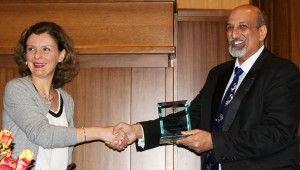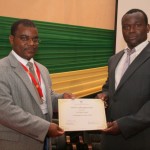Outstanding Senior African Scientist
This prize is awarded to a senior scientist based on a number of criteria, including innovation/ Intellectual Property, impact of research, publications and advocacy for health. It aims at fostering the research activities of the winners, with the aim of strengthening clinical research capacity in sub-Saharan Africa.
The Outstanding Senior African Scientist award consists of a recognition trophy and a cash prize of €20,000.
Recipients of the Outstanding Senior African Scientist Award
2011

Professor Salim Abdool Karim
Prof. Salim Abdool Karim (University of KwaZulu Natal, South Africa) has been enormously successful throughout his career, and has made numerous seminal contributions to our understanding of HIV and TB epidemiology, and more recently to optimising treatment at the intersection of the TB and HIV epidemics, and optimizing prevention of HIV transmission. It is hard to imagine a research program more relevant to the most pressing global health problems facing not just Africa but the world, nor a single individual who has had more impact on building local scientific capacity. More recently, he has established long term collaboration with Howard Hughes Medical Institute (HHMI) that is creating the world’s first research program dually dedicated to integrated TB and HIV research. There are truly incredible accomplishments.
2009

Dr Alexis Nzila
Dr Alexis Nzila is Head of the Molecular Parasitology Group at the KEMRI Wellcome Trust Research Programmme in Kilifi, Kenya. He was trained in France and started in Postdoctoral work at the KEMRI/Wellcome Programme in Kenya in 1996. His research focused on the understanding of the mechanism of resistance to pyrimethamine/ sulfadoxine and chlorproguanil/ dapsone, 2 antifolate drugs used to treat malaria. He has made a substantial contribution to our understanding of the mechanism of antifolate resistance and helped in developing simple ways of tracking drug resistance against malaria.
He has developed an innovative approach in discovering new drugs by using experience in cancer research. Indeed malaria and cancer cells have one similarity in that they rely heavily on the availability of folate. Thus, many strategies to inhibit cancer cells by blocking folate metabolism can also be applied in malaria. He has exploited this approach, and this has led lead some important discoveries.
He has identified simple of ways of reversing pyrimethamine/sulfadoxine resistance in malaria using the ucosuric agent probenecid. This finding has been confirmed in vivo, in children suffering from malaria. His group has recently shown that this compound can increase the activity of the new antimalarial drug, piperaquine, which has been combined with dihydroartemesine as Artekin®. Thus, this is a potential of using probenecid to chemosensitve malaria parasite to antimalarials in vivo.
Still using experience in cancer research, he has also proposed that low and safe dose of some anticancer drugs can also be used to treat malaria. Recently he and his colleagues at KEMRI have carried out a Phase I evaluation of one of this anticancer drugs, methotrexate, in adult healthy volunteers. Others anticancer drugs are in the pipeline to be tested. His work has demonstrated that there is a possibility of discovering new drugs against malaria by using anticancer pharmacopeia.
Extending on his knowledge of antifolate resistance, Dr Nzila is now working on understanding the mechanism of resistance to other antimalarial drugs, including lumefantrine and piperaquine.
Dr Nzila is also actively involved in the training and capacity building of young scientists in Kenya. One of his students, Leah Mwai, is a recipient of EDCTP studentship.
But winning is not new to Dr Nzila. In 2006, he won the Royal Society Pfizer Award, UK – for ” contribution In drug resistance and drug discovery in malaria”
